What to Expect During an Asphalt Paving Project in Rotterdam, NY
During an asphalt paving project in Rotterdam, NY, you'll want to meticulously plan to circumvent any potential inconveniences. Begin by allocating your financial budget and organizing essential resources proficiently. Establish a precise start date for the project and communicate this to all involved parties, such as local businesses and residents, to minimize disruptions.
Select a reputable contractor, taking into account their professional experience, feedback from previous clients, and possession of relevant certifications like ISO certification.
Factor in important project specifics and collaborate effectively with your contractor to manage vehicular and pedestrian traffic flow, addressing any possible disturbances proactively. Explore different asphalt options tailored to your needs, such as Recycled Asphalt Pavement for eco-friendliness or Porous Asphalt for better water management.
Maintain transparent and continual communication with your contractor to ensure the project unfolds smoothly. Stay updated on project milestones and essential maintenance practices post-completion to ensure the prolonged durability of the pavement.
By adhering to these strategic steps, you can ensure efficient navigation through the complexities of the asphalt paving project.
Preparing for the Project

When orchestrating an asphalt paving endeavor in Rotterdam, NY, effective budget management is essential to allocate resources efficiently and prevent expensive setbacks. This foundational measure paves the way for a prosperous undertaking.
Initially, establish a definite commencement date for the project, which aids in overall coordination and scheduling, enabling the preparation of all stakeholders involved. Moreover, notify employees, clientele, or residents about the impending construction to minimize any inconvenience.
Choosing a trustworthy asphalt paving contractor in Rotterdam is crucial. Opt for companies that boast a history of exemplary service and positive feedback from the community. Additionally, ensure meticulous collaboration with the selected contractor to guarantee a seamless and productive asphalt paving operation.
Coordinating Stakeholders

It's essential for you to proactively communicate project specifics to stakeholders in advance, guaranteeing that everyone is adequately informed and prepared.
In the context of an asphalt paving project, grasping the project timeline is essential for property managers and stakeholders. They need to comprehend that the planning phase typically spans 2-4 weeks, the preparation phase extends over 1-2 weeks, and the actual paving process can last from several days up to a few weeks.
It's crucial also to manage expectations regarding the project's duration, ensuring that all stakeholders are well-informed about the anticipated timeframe.
You should alert employees, customers, and tenants about the forthcoming asphalt paving activities to prevent any unforeseen disruptions or inconveniences. It's pivotal that they're made aware of the zones that will be impacted and any safety measures they should adopt.
Your selected asphalt contractor should collaborate closely with you to facilitate a seamless transition for all parties involved. Engaging in preliminary discussions about the project scope and potential disturbances helps mitigate the impact on stakeholders and guarantees a successful project completion.
Choosing an Asphalt Contractor
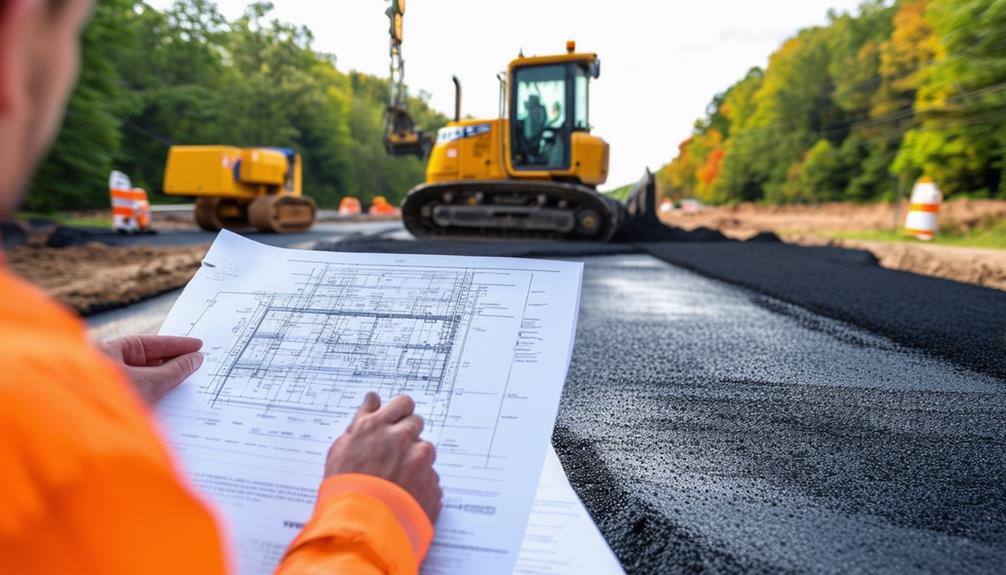
To ensure a successful asphalt paving endeavor in Rotterdam, NY, selecting an appropriate contractor is paramount, necessitating meticulous evaluation of their expertise, credentials, and client feedback. Asphalt paving specialists who've amassed a substantial track record of executing akin assignments in the region should be prioritized. This not only indicates that they've managed projects within the vicinity but also underscores their proficiency with the distinct climatic conditions and regulatory requirements specific to Rotterdam.
In addition to field experience, a contractor must hold relevant certifications, such as those from the Occupational Safety and Health Administration (OSHA) and the Environmental Protection Agency (EPA). These accreditations confirm the contractor's commitment to adhering to safety and environmental protocols. Such credentials provide reassurance that the paving service abides by industry-sanctioned best practices and benchmarks.
Moreover, scrutinizing customer evaluations and endorsements from prior clientele offers insights into the contractor's reputation for delivering quality work and adhering to project timelines.
Conclusively, verifying the contractor's insurance coverage is imperative, ensuring protection against potential incidents or damage to property. Engaging a dependable contractor equipped with the requisite skills, certifications, and positive customer feedback can substantially enhance the likelihood of a seamless and successful asphalt paving project in Rotterdam, NY.
Understanding Asphalt Options
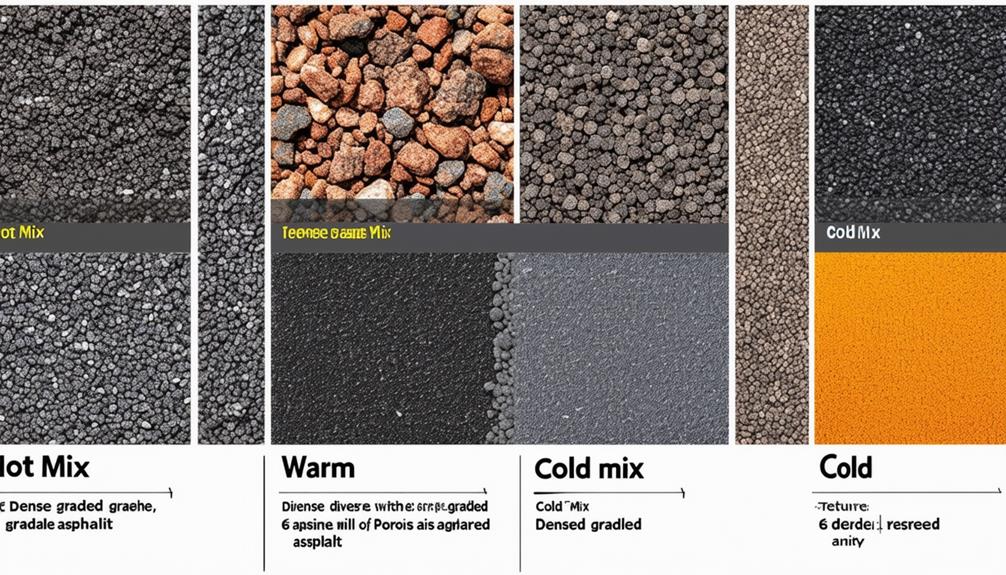
When selecting the optimal asphalt type for your venture, assess the particular demands and prerequisites of your undertaking, as each alternative presents distinct advantages and performance traits.
For eco-conscious endeavors, Recycled Asphalt Pavement (RAP) serves as a sustainable selection, diminishing waste and conserving precious resources.
Additionally, Warm Mix Asphalt (WMA), which is synthesized at reduced temperatures, diminishes emissions and lowers energy consumption.
Should your requirement be effective stormwater management, Porous Asphalt offers an excellent solution by facilitating water drainage through the pavement structure, thereby mitigating runoff.
For enhanced durability and minimal maintenance requirements, the Perpetual Pavement design is advisable. This methodology integrates various layers of asphalt to guarantee that your pavement remains functional for over 50 years with appropriate maintenance and rehabilitation interventions.
Thin Overlays provide another economical approach to revitalize existing asphalt surfaces without necessitating a complete reconstruction.
With a plethora of choices at your disposal, it's crucial to comprehend the specific needs of your project and opt for the asphalt variant that optimally aligns with your project specifications.
Managing Traffic Disruption
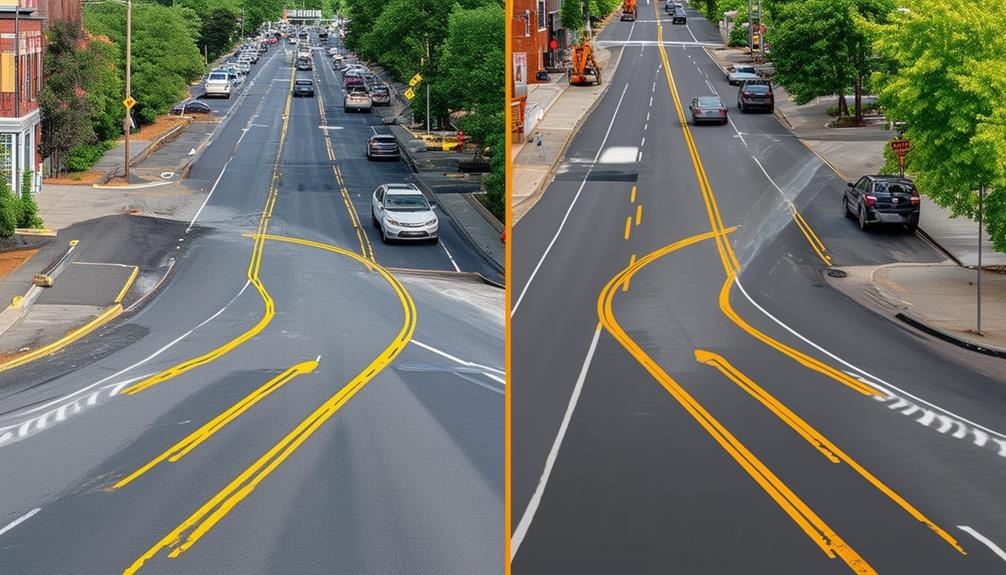
Redirecting vehicular flow around construction zones is essential and formidable when paving asphalt thoroughfares in Rotterdam, NY. Temporary roadway closures and strategic detours are implemented to navigate vehicles around the construction sites, ensuring commuter safety and reducing interruptions.
Traffic controllers and visible signage are utilized to steer drivers through the affected areas, providing critical guidance to sustain fluid traffic movement.
To alleviate vehicular buildup, alternative routes and scheduling insights are proposed to bypass peak travel times. This meticulous strategy ensures that the impact of traffic disturbances on local commerce and daily activities is lessened.
Furthermore, collaboration with municipal authorities and local enterprises ensures a united effort in preserving orderly vehicular movement during the roadwork.
Effective traffic management strategies are pivotal to the success of the asphalt paving initiative. They protect both construction personnel and vehicle operators, ensuring that all measures are in place to prevent mishaps.
Scheduling Asphalt Paving Work
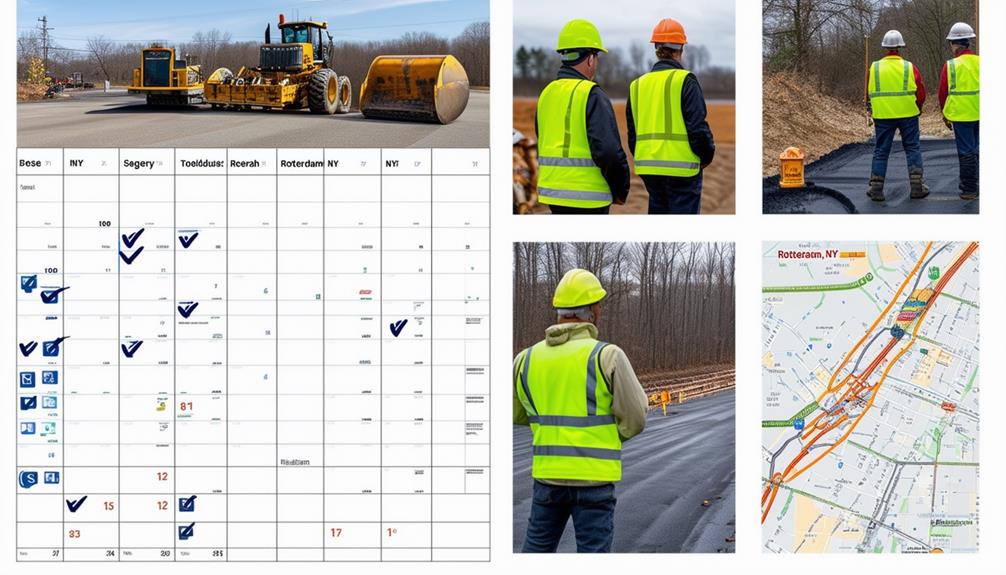
In planning asphalt paving projects in Rotterdam, NY, contractors prioritize monitoring meteorological conditions to ascertain optimal paving conditions. This meticulous attention to the weather helps guarantee that your driveway or parking facility asphalt is laid down during the best possible times, ensuring durability and longevity.
The progression timelines in Rotterdam, NY are shaped by various elements, such as the scope and intricacy of the project, as well as any unforeseen hold-ups. Contractors will typically furnish expected initiation and culmination dates to maintain transparency and keep you aligned with the project pace.
Nonetheless, the availability of key resources such as materials, machinery, and skilled labor can influence the scheduling of your asphalt paving venture, highlighting the importance of maintaining flexibility and open communication with your paving specialist.
Efficient scheduling necessitates collaboration among contractors, clients, and additional stakeholders to minimize interruptions and elevate project efficiency. Engaging actively with your contractor facilitates a streamlined process aligning with your specifications, all the while ensuring that your asphalt installation meets high quality standards.
Role of Community Engagement
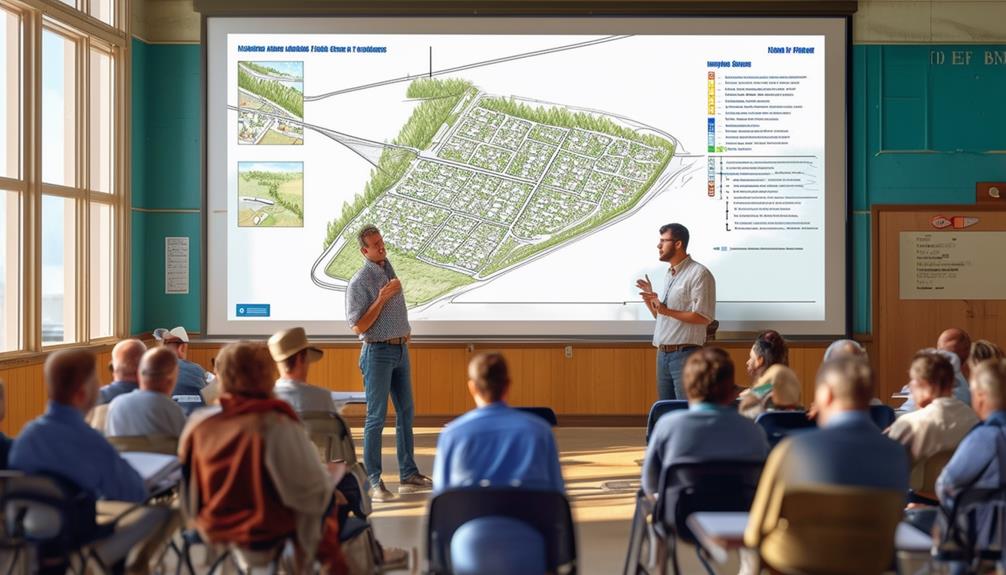
As asphalt paving initiatives progress in the Rotterdam, NY area, effective engagement with the local community is crucial for the success of these projects and for minimizing disruptions to residents' daily routines. Engaging with the community entails promptly informing residents, businesses, and other stakeholders about impending asphalt paving activities, addressing their queries and concerns, and providing comprehensive schedules.
This clear communication strategy is foundational for managing community expectations and reducing potential inconveniences that might occur during the paving process. Effective community engagement ensures that all parties, including residents, employees of local enterprises, and property tenants, are well-informed about the extent of the project. This encompasses data on temporary disruptions such as parking lot closures and alterations to access routes that might affect their day-to-day operations.
Details pertaining to the project, including construction timelines and designated work zones, should be articulated clearly to avoid any confusion and facilitate a smooth transition. By cultivating an atmosphere of open dialogue and cooperation, the community can actively contribute to and support the asphalt paving ventures, eventually viewing the updated infrastructure as a significant enhancement to their environment.
Asphalt Paving Project Timeline
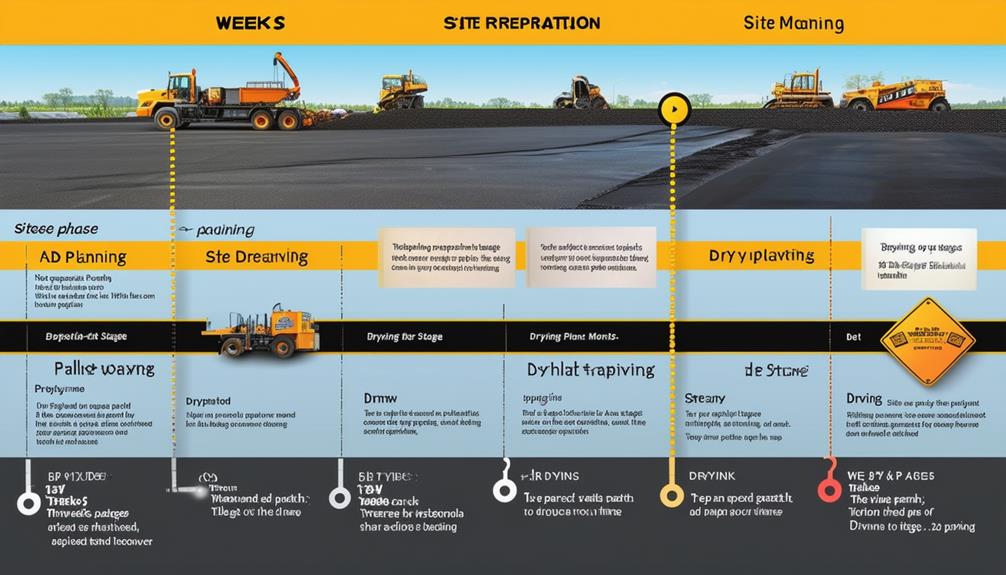
An asphalt paving project in Rotterdam, NY unfolds through a series of distinct stages, each vital for the comprehensive transformation of the designated area. Grasping this project timeline is essential for effectively managing your schedule and expectations.
The duration of the project can differ notably depending on the extent of the area being paved, prevailing weather conditions, and additional services such as sealcoating or striping that might be required. A proficient paving contractor will engage actively with you to synchronize the different aspects of the project. This coordination includes addressing logistical concerns like debris disposal, management of abandoned vehicles, and harmonizing with landscaping tasks to mitigate any disruptions.
Maintaining clear and consistent communication with your contractor is pivotal for ensuring that the project adheres to the agreed timeline.
Your active participation is crucial in ensuring the smooth execution of the paving project. Effective coordination with stakeholders, including employees, customers, or tenants, is imperative to ensure they're well informed and adequately prepared for the upcoming construction activities. By thoroughly understanding the project timeline and collaborating closely with your paving contractor, you're positioned to efficiently and effectively revitalize your area.
Post-Paving Maintenance and Care

Regular consultations with your contractor are essential after the completion of asphalt paving to guarantee that comprehensive maintenance programs are developed to ensure the ongoing preservation of the pavement.
You now possess a meticulously paved area, and it's imperative to uphold its appearance and functionality. Post-paving care comprises various crucial activities. Commence by applying a sealant to your parking area or driveway periodically to shield it from deterioration. This procedure can significantly prolong the lifespan of your asphalt surface.
Ensure that your striped parking area remains distinctly visible and easy to navigate by conducting periodic enhancements.
Routine evaluations will aid in the early discovery of potential issues, such as sinkholes and water drainage concerns, which can be corrected swiftly to avert further harm. Keeping your pavement devoid of debris and clean is also essential.
Refrain from utilizing heavyweight machinery or sharp implements that might impair the surface. By diligently adhering to these maintenance tasks, you'll be able to enjoy your newly installed asphalt surface for an extended duration.
Don't delay costly repairs that could become necessary; instead, remain proactive to maintain the structural integrity of your asphalt pavement.
Frequently Asked Questions
What Are the Steps in Using Asphalt in the Project Implementation?
During an asphalt paving project, here's the sequence of steps to anticipate:
Initially, the asphalt mixture is crafted in line with the job mix formula (JMF), ensuring it adheres to quality control (QC) standards.
Subsequently, specialized paving equipment is utilized to deploy the mixture.
Surface preparation is paramount, involving meticulous cleaning, grading, and compacting to establish a smooth foundation.
In the final stage, quality control technicians (QCTs) oversee the process to certify that the asphalt conforms to specifications, guaranteeing a robust and enduring outcome.
What Not to Do on a New Asphalt Driveway?
When you install a new asphalt driveway, it's crucial to avoid specific actions to preserve its integrity and extend its lifespan.
Avoid parking heavy vehicles or machinery on the new surface to prevent any depressions or marks.
It's also advisable not to use sharp implements or corrosive chemicals that could deteriorate the asphalt's structure.
Additionally, refrain from turning your vehicle's wheels when the car is stationary to avoid putting undue stress on the asphalt.
Finally, it's important not to apply sealant or protective coatings immediately after installation.
Following proper maintenance guidelines and understanding the common pitfalls will significantly contribute to the longevity of your driveway.
Furthermore, considering safety measures for any personnel involved and minimizing environmental degradation is vital.
What Is the Process of Asphalt Paving a Road?
Are you curious about the process involved in asphalt paving a road?
Road construction encompasses a variety of crucial stages. Initially, any existing pavement is demolished and cleared away. Subsequently, the sub-base is meticulously prepared with materials such as crushed stones or recycled asphalt products.
Following this, the asphalt mixture is carefully applied and then compacted using robust construction machinery.
To finalize the construction, stringent quality control protocols are observed to verify the uniformity in thickness and density of the pavement.
Regular maintenance will ensure that your roadway remains in excellent condition.
How Do You Prepare Asphalt for Paving?
When preparing asphalt for paving, it's crucial to concentrate on comprehensive surface cleaning to eliminate all debris, dirt, and any potential contaminants. Carefully inspect the underlying base to confirm its stability and levelness, ensuring it meets the required standards for a solid infrastructure.
Choose the asphalt materials that are best suited for the specific environmental conditions and traffic patterns of the project area. During the paving preparation, adhere to industry-standard protocols for both material selection and surface cleaning processes to guarantee a robust foundation and a smooth, uniform finish.
This meticulous preparation is essential for achieving a durable and aesthetically pleasing asphalt pavement.
Conclusion
Asphalt paving endeavors in Rotterdam, NY, necessitate meticulous preparation to reduce interruptions. Collaborate with your contractor to strategically plan, supervise vehicular movement, and guarantee the installation of proper signage.
Opt to conduct operations during off-peak hours and contemplate segmenting extensive projects. Effective dialogue and adaptable arrangements are crucial to maintaining your enterprise accessible and functional throughout the advancement.
Subsequent to finalization, commit to consistent upkeep for enduring outcomes.
